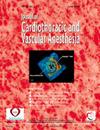623例心脏手术出血患者接受重组VIIa治疗的死亡率特征
IF 2.1
4区 医学
Q2 ANESTHESIOLOGY
Journal of cardiothoracic and vascular anesthesia
Pub Date : 2025-07-21
DOI:10.1053/j.jvca.2025.07.024
引用次数: 0
摘要
目的:活化重组因子VII (rFVIIa)已被用于治疗超说明书方式的心脏手术出血。由于持续出血的死亡率很高,评估rFVIIa给药的潜在血栓形成效应的风险是很重要的。本报告分析了因非手术性出血而接受极低剂量rFVIIa治疗的患者的死亡率特征。设计:回顾性队列研究。环境:三级保健医院。参与者:2012年1月至2025年1月,7724例心脏手术患者,其中623例接受了rFVIIa。平均给药剂量为18 μg/kg(最小-最大6 ~ 55 μg/kg)。干预措施:围手术期以0.5- 1mg等量给予rFVIIa。测量结果及主要结果:623例患者中,66例死亡,557例存活。幸存者与非幸存者给予的rFVIIa的中位剂量没有差异(分别为2.17 v 2.79 mg;P = 0.001)。手术类型与死亡率相关(p = 0.004),因心脏移植、心室辅助装置或其他复杂手术而接受rFVIIa的患者死亡率为29.5%。其中大多数是心室辅助装置患者。接受主动脉手术的患者(n = 250)死亡率为12.4%。103例冠状动脉旁路移植术患者中,除1例患者外,其余患者均存活。急诊或紧急手术(p < 0.001)、术前心源性休克(p = 0.021)、体外循环时间较长(p = 0.005)、术后心脏骤停(p = 0.001)和接受较多血液制品(p < 0.001)的患者死亡率较高。死亡率与中风(p = 0.071)或感染(p = 1.00)之间没有关联。结论:与未接受rFVIIa的心脏手术患者相似的与死亡率相关的特征,rFVIIa可用于心脏手术患者。本文章由计算机程序翻译,如有差异,请以英文原文为准。
Characteristics Associated with Mortality in 623 Patients Who Received Recombinant Factor VIIa for Bleeding in Cardiac Surgery
Objectives
Activated recombinant factor VII (rFVIIa) has been used to treat cardiac surgical bleeding in an off-label manner. Due to the high risk of mortality with ongoing hemorrhage, assessing the risk of potential thrombotic effects of rFVIIa administration is important. This report analyzes the characteristics associated with mortality in patients who received very-low-dose rFVIIa for nonsurgical bleeding.
Design
A retrospective cohort study.
Setting
A tertiary care hospital.
Participants
There were 7,724 patients who had cardiac surgery from January 2012 to January 2025 with 623 receiving rFVIIa. The average dose of rFVIIa given was 18 μg/kg (min-max, 6-55 μg/kg).
Interventions
rFVIIa was administered perioperatively in doses of 0.5- to 1-mg aliquots.
Measurements and Main Results
Of the 623 patients, 66 died and 557 survived. The median dose of rFVIIa given was not different in survivors versus nonsurvivors (2.17 v 2.79 mg, respectively; p = 0.001). Procedure type was associated with mortality (p = 0.004) as patients receiving rFVIIa for heart transplant, ventricular assist device, or other complex procedure had a mortality rate of 29.5%. with the majority of these being in ventricular assist device patients. Those who underwent aortic procedures (n = 250) had a mortality rate of 12.4%. Of the 103 patients undergoing coronary artery bypass grafting who received rFVIIa, all but one patient survived. Mortality was higher in patients who had emergent or urgent surgical procedures (p < 0.001), preoperative cardiogenic shock (p = 0.021), longer cardiopulmonary bypass time (p = 0.005), postoperative cardiac arrest (p = 0.001), and received more blood products (p < 0.001). There were no associations between mortality and stroke (p = 0.071) or infections (p = 1.00).
Conclusion
rFVIIa can be administered to cardiac surgical patients with characteristics associated with mortality that are similar to cardiac surgical patients who did not receive rFVIIa.
求助全文
通过发布文献求助,成功后即可免费获取论文全文。
去求助
来源期刊
CiteScore
4.80
自引率
17.90%
发文量
606
审稿时长
37 days
期刊介绍:
The Journal of Cardiothoracic and Vascular Anesthesia is primarily aimed at anesthesiologists who deal with patients undergoing cardiac, thoracic or vascular surgical procedures. JCVA features a multidisciplinary approach, with contributions from cardiac, vascular and thoracic surgeons, cardiologists, and other related specialists. Emphasis is placed on rapid publication of clinically relevant material.

 求助内容:
求助内容: 应助结果提醒方式:
应助结果提醒方式:


